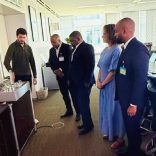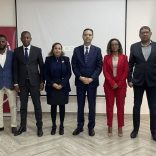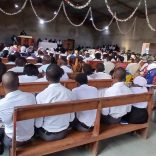Just In: Mozambique suspends licensing for production and sale of alcoholic beverages
“Today I am a young woman of value”

Hortência Zeca. [Photo: US Embassy in Mozambique]
“For chicken to grow well, we must pay attention to the quality and quantity of their feeding. We must also take special care of where the chicks sleep and with their health,” says laughingly Hortência Zeca, 22, a DREAMS beneficiary resident in Chimoio, central Mozambique.
Hortencia’s knowledge on chicken farming is recent and impressive (2021). She shows remarkable passion to her newly acquired skill. After all, this has transformed her current livelihood and instilled hope for a better future.
“I raise chickens and with the earnings I get, I am able to feed my two brothers and keep them in school… I am also saving money to continue my studies next year. I want to be a Geography teacher,” she says, with a confident smile on her face.
Today, Hortência can dream, but her not so distant past was extremely challenging. It all seemed so complicated. Hortência lost her parents when she was only 10 years old. Since then, she has had to take care of her two younger siblings. At the age of 12, she started working as a maid, but her income was not sufficient to cover for their needs. When she turned 17, Hortência resorted to transactional sex with multiple partners as a way to make ends meet.
“I was a worthless little girl,” Hortência says with an emotional tone.
But her story changed from last year (2021), when she met Juleca Júlio, a neighbour and a DREAMS mentor. DREAMS is a PEPFAR funded initiative led by the Mozambican Government that aims at reducing the vulnerability risk of adolescent girls and young women to HIV and GBV.
” Juleca was leading a Social Asset Building session in a girls’ club in the community. She was addressing the health risks of having multiple sexual partners. I became so upset and thought that I should get out of that situation immediately,” she revealed.
Hortência approached Juleca and told her story. They began a friendly relationship calling themselves “the only ones”.
“When learnt about Hortência’s story, I realized she was vulnerable to HIV and how much she could benefit in enrolling in DREAMS” said Juleca.
Based on her (Hortência’s) vulnerability, she was deemed eligible to enrol in the DREAMS program and benefit among other interventions, an economic empowerment model called SIYAKHA. It is a comprehensive model optimised for raising the employability level of AGYW [Adolescent Girls and Young Women]. It gives AGYW access to entrepreneurship skill building in diverse trades that are highly demanded in the local market (either through self-employment and /or group enterprise).
The Association for Self-Sustainable Development (ANDA) is the DREAMS IP in Chimoio. Hortência entered the DREAMS program through ANDA and benefitted from the farming course. Thanks to a partnership with the Institute of Agricultural Research of Mozambique (IIAM) – a public institution, Hortência and other eligible girls started the course.
The short-term training, which lasts about a month and half, includes theoretical and practical content necessary for the trainees to effectively start vocational activities such as a chicken farming and micro business development.
“Since these are vulnerable girls, they must have tools to enter in the local job market. We have received students as young as 16-year-old who are adolescent mothers. They must have the means to support themselves,” argues Carlos Quembo, IIAM’s Central Regional Delegate.
“Many times, other programs focus more on the adult caregivers and not at their children. This model opens the possibility to have them contribute to the household.” adds Carlos.
Besides being a micro-entrepreneur in aviculture, Hortência has recently become a DREAMS mentor which is a step ahead in promoting an AIDS free community.
“I like my job and I am happy to be a role model for other girls so that they become empowered and believe that things can change,” says Hortência.
DREAMS is implemented in 32 districts in 8 provinces with high HIV incidence in Mozambique. One of its strategic pillars is to reduce the economic vulnerability of AGYW through comprehensive Economic Empowerment models. Currently there are two ongoing models which have supported above 400 AGYW in raising their employability level and become self-reliant.












Leave a Reply
Be the First to Comment!
You must be logged in to post a comment.
You must be logged in to post a comment.